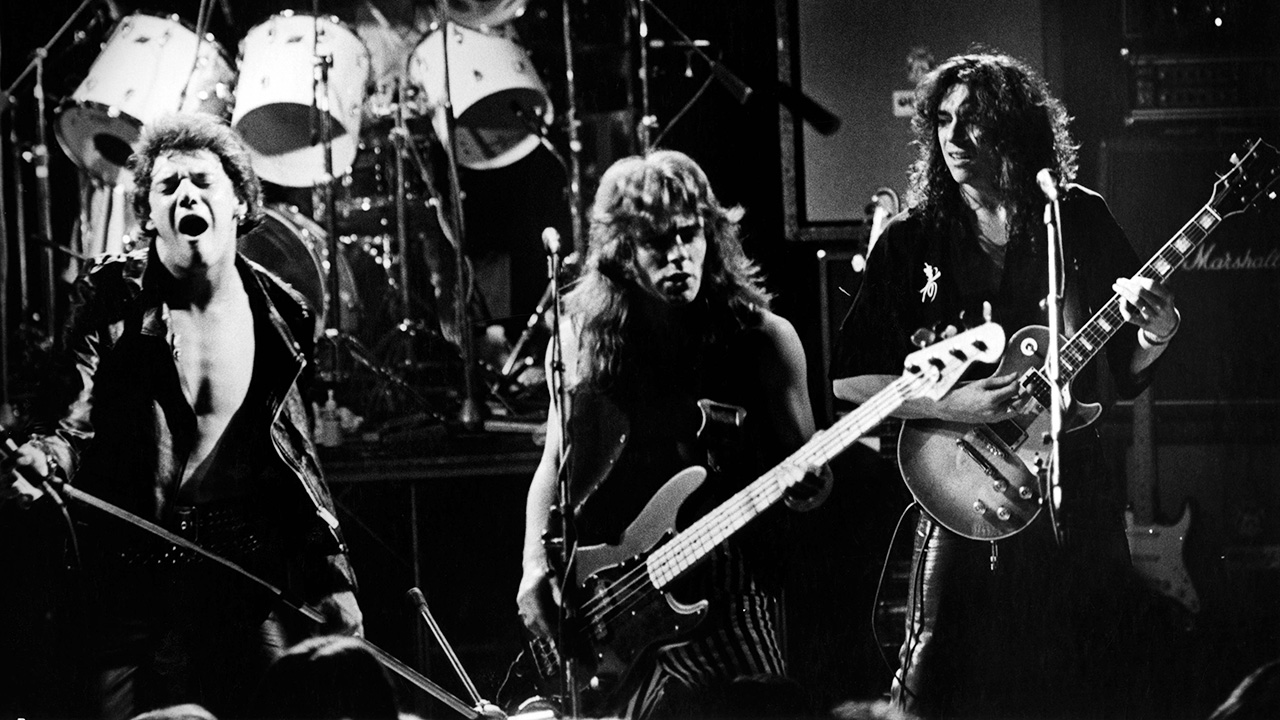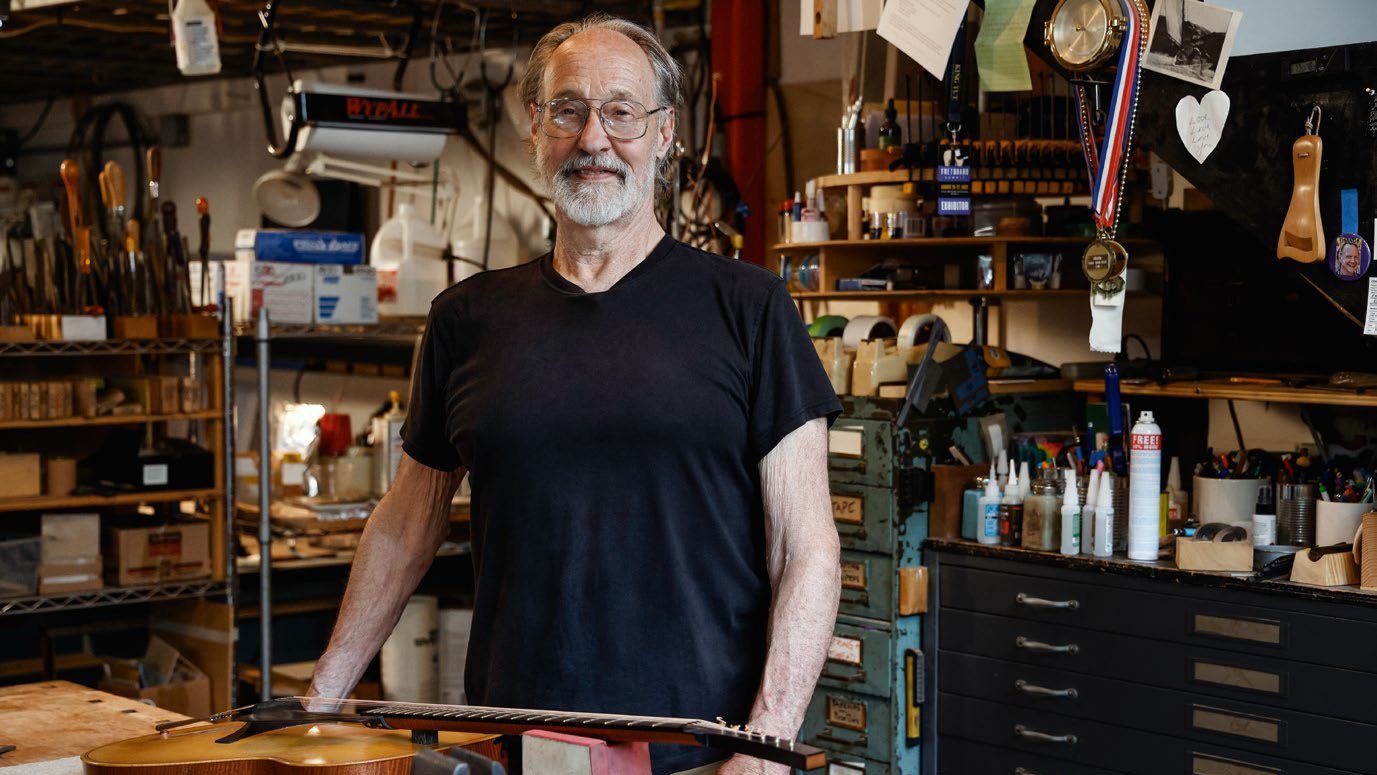“My being fired was premature… We’d wrapped pre-production on Killers but I never got the chance to record”: Meet Dennis Stratton, the man who brought harmony guitars to Iron Maiden
Armed with a Les Paul Custom copy and an obscenely heavy old combo amp, Stratton only discovered metal when he joined the future giants – and left them the legacy of harmony guitar attack

Since 1980, when Iron Maiden dropped their self-titled debut onto the masses, the London-bred NWOBHM icons have been defined by a multi-guitar attack.
During the band’s heyday, that was delivered by Adrian Smith and Dave Murray, and later, Murray and Janick Gers, who arrived in 1990 after Smith departed. When Smith returned in ’99, it became a triple-guitar attack.
But prior to that, Murray was positioned alongside Dennis Stratton, who says he brought the band’s definitive approach to the forefront. “I was never totally heavy metal like the other guys in Maiden were,” Stratton tells Guitar World.
“I listened to heavy rock like Whitesnake, Bad Company and UFO, but they weren’t really heavy metal. I brought a few things to Maiden that they still use today. They still use the harmony guitar style, which they weren’t doing before me. I’m very proud that whatever I took into Maiden, it’s still there.”
After leaving Maiden, Stratton formed Lionheart, who made a record in ’84 called Hot Tonight, before disbanding a few years later, when he joined a rebooted Praying Mantis in 1990, remaining until 2003. From there, he laid low until reforming Lionheart.
Two new records – Second Nature (2017) and The Reality of Miracles (2020) followed – and now the band has released another, The Grace Of A Dragonfly.
“It’s a concept album,” Stratton says. “People are saying it's about war, but not about war; it's about the people who fought in wars that served their countries – who sacrificed their lives during the war so that we can live a free life.”
All the latest guitar news, interviews, lessons, reviews, deals and more, direct to your inbox!
Asked how he approaches the guitar in Lionheart compared to his days in Maiden, he shrugs. “I’m kind of off-the-cuff still,” he admits. “But I still look to add soaring harmony guitars and brilliant things that generate interest.
“I’m not the sort of guitarist who is angry or trying to outplay everyone. I do the best I can, but the arthritis kicks in now and again in my wrists and fingers. I’ve matured enough to where I can work around that. Beyond that, I compliment the song and let the rest care for itself.”
What sparked your interest in heavy metal?
“Probably joining Iron Maiden! I was into hard rock. Steve Harris and Dave Murray would come to watch me play with a band I was in at the Bridge House pub on Sunday nights, and that’s where we met in ’79.
“Maiden had just signed a deal with EMI, and after seeing me play, they asked me to join. When I joined, there was only Steve, Dave, and [vocalist] Paul Di’Anno, but then they got me, and we found Clive Burr on drums. Off we went.”
Maiden’s self-titled debut is a favorite of many. It sounds like – despite your differences in taste – you got on well.
“I was quite lucky because Steve and Dave already knew what I did, who I was and how I played. Even though I’d never played metal before, I could take what I knew and feel comfortable.
“All the bands I’d been in were tremendous and had two-part harmony guitars, so I could take that into Maiden and introduce it to them.”
Was the chemistry between you and Dave immediate?
“More or less. It was quite lucky that they knew what I was like and that I could bring the harmony in, and because of that we got along fine.”
What gear did you use on Maiden’s debut?
“I had an old HH amp that was kind of like a Fender Twin Reverb – but obviously not a Fender. It was this great old combo amp, and I got great tones out of it.
Ace Frehley would only come out of his dressing room when Kiss were about to go on stage. So, sadly, I didn’t have many words with him
“I also have a Silvertone Twin from the ‘60s that I put great big JBL cone speakers into. The thing weighed a ton; once we went out on the road, the crew didn’t like it!”
Did you deploy any effects pedals?
“Oh, yeah, I had a few foot pedals. All of them were very old, and I can’t remember the brand of any of them. I know I had a reverb pedal, but the amp also had reverb. The way I got distortion was I kind of pushed the amp and got a lot through using gain. For the most part, the pedal I used was an old chorus pedal, which was great for clean sounds.”
Do you recall what guitar you used while recording classic songs like Iron Maiden and Transylvania?
“For the entire record, I used just my one Les Paul Custom. I liked that guitar as I was a big fan of [Free’s] Paul Kossoff, and he used one just like it. Paul collected Les Paul guitars. He had so many of them, and I fell in love with them.
“But mine wasn’t a Gibson; it was a Zenta Les Paul Custom copy. I bought a real Gibson Les Paul Custom once we went on tour, along with a Gibson Firebird, which I thought looked flashy and in line with the metal scene.”
On that tour, Iron Maiden opened for Kiss. What was that like?
“It was fantastic. Maiden hopped on as openers for Kiss’s European tour while they were promoting Unmasked, I believe. We had so many fans at the shows to see us, and we put on a great show. I think that’s why Kiss decided not to have us support them in the UK – we had too many fans coming to see us!”
Did you get on well with Paul Stanley and Gene Simmons?
“Oh, yeah, I got on really well with Paul and Gene. We used to have lots of chats backstage. When we went to Stockholm in October of 1980, Gene and Paul took me to dinner for my birthday with Dave Murray. That was quite a special treat for me.”
And how about your fellow guitarist, Ace Frehley?
“Ace played great on that tour – but unfortunately, he was very, very quiet. He never really came out of his dressing room at all, so I only got to meet him a few times for a few moments.
I don’t regret how it was… you’ve got to admire what Maiden have done
“I got a few photos with him, but he would really only come out of his dressing room when Kiss were about to go on stage. So, sadly, I didn’t have many words with him. But Eric Carr was brilliant and very kind.”
There have been conflicting reports regarding your departure from Iron Maiden. Can you settle the score?
“The truth is that I never saw eye-to-eye with Rod Smallwood, who managed Maiden back then. He was basically the headmaster, which was really about trying to keep five young kids together. I was older than the other guys, so I was used to having my freedom, which caused issues.”
How so?
“Sometimes I’d travel from gig to gig with just the crew for a laugh or a change of scenery. And then, sometimes I’d go from venue to venue in one of the trucks with a driver, just to keep them company, to see different parts of the world, and for different sorts of conversations. But Rod didn’t like that.”
Do you regret not sticking around, considering how massive Iron Maiden became?
“No, I don’t regret how it was. At the end of the day, Maiden were a new band, and it was all about gelling and learning. It wasn’t just musical learning, but learning habits and all that.
“But my being fired was premature because we hadn’t been together long enough. When I was fired, we’d already wrapped pre-production on the second album, Killers. I’d worked on the whole album but I never got the chance to record.
“The entire thing was premature, but what’s done is done. You’ve got to admire what Maiden have done, how far they’ve come and how big they are.”
- The Grace Of A Dragonfly is out now via Metalville and available from Stratton’s website.
Andrew Daly is an iced-coffee-addicted, oddball Telecaster-playing, alfredo pasta-loving journalist from Long Island, NY, who, in addition to being a contributing writer for Guitar World, scribes for Bass Player, Guitar Player, Guitarist, and MusicRadar. Andrew has interviewed favorites like Ace Frehley, Johnny Marr, Vito Bratta, Bruce Kulick, Joe Perry, Brad Whitford, Tom Morello, Rich Robinson, and Paul Stanley, while his all-time favorite (rhythm player), Keith Richards, continues to elude him.

